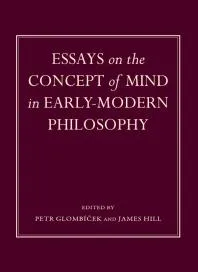Essays on the Concept of Mind in Early-Modern Philosophy
4.9
Reviews from our users

You Can Ask your questions from this book's AI after Login
Each download or ask from book AI costs 2 points. To earn more free points, please visit the Points Guide Page and complete some valuable actions.Welcome to "Essays on the Concept of Mind in Early-Modern Philosophy", a profound exploration of the evolving notions of mind that shaped early-modern thought. Authored by Petr Glombíček and James Hill, this book intricately intertwines philosophical analysis with historical context to provide a comprehensive understanding of how thinkers such as Descartes, Locke, and Hume redefined the nature of the human mind.
Detailed Summary of the Book
This collection of essays delves into the philosophical evolution during the early-modern period, examining key figures and their contributions to the concept of the mind. The book begins with an exploration of René Descartes, whose dualistic approach set the stage for future debates. It subsequently considers John Locke's empirical perspectives, positioning the mind as a "tabula rasa" shaped by experience. Furthermore, the text investigates George Berkeley's idealistic views and David Hume's skepticism, offering a rich tapestry of intellectual inquiry that challenges, complements, and contests traditional notions.
Each chapter meticulously dissects the arguments and counter-arguments presented by these influential philosophers, highlighting the diversity of thought in this era. By critical analysis of their writings and personal correspondences, the authors elucidate how these theories and philosophies influenced not only their contemporaries but also laid the groundwork for modern psychological and epistemological studies.
Key Takeaways
- Understanding the evolution of dualism and its limitations through the work of Descartes and subsequent thinkers.
- Appreciating the impact of Locke’s theories on contemporary views of empiricism and personal identity.
- Exploring the shift from metaphysical certainty to skeptical inquiries about the self and external reality.
- Analyzing the interplay between philosophical thought and the scientific advancements of the period.
Famous Quotes from the Book
"The mind, like a shadow, follows wherever the light of inquiry is cast."
"To comprehend the mind, one must navigate the labyrinths of both doubt and belief."
Why This Book Matters
"Essays on the Concept of Mind in Early-Modern Philosophy" is not merely an academic exercise; it’s an essential compendium for anyone intrigued by the philosophical underpinnings of modern consciousness. By traversing the intellectual landscapes sketched by these early-modern thinkers, readers gain insight into the foundational questions of human existence and cognition. This book serves as an invaluable resource for philosophy students, scholars, and enthusiasts who wish to understand the roots of contemporary debates on the mind and its mechanisms.
The text offers a well-rounded examination of philosophical evolution, helping readers appreciate the dynamic interplay between reason, perception, and scientific progress. Its meticulous scholarship and lucid exposition make complex ideas accessible without sacrificing philosophical rigor, ensuring that it occupies a pivotal place in any serious philosophical discussion.
Free Direct Download
You Can Download this book after Login
Accessing books through legal platforms and public libraries not only supports the rights of authors and publishers but also contributes to the sustainability of reading culture. Before downloading, please take a moment to consider these options.
Find this book on other platforms:
WorldCat helps you find books in libraries worldwide.
See ratings, reviews, and discussions on Goodreads.
Find and buy rare or used books on AbeBooks.
1226
بازدید4.9
امتیاز50
نظر98%
رضایتReviews:
4.9
Based on 0 users review
"کیفیت چاپ عالی بود، خیلی راضیام"
Questions & Answers
Ask questions about this book or help others by answering
No questions yet. Be the first to ask!


